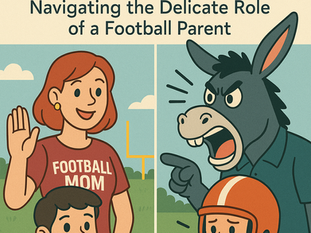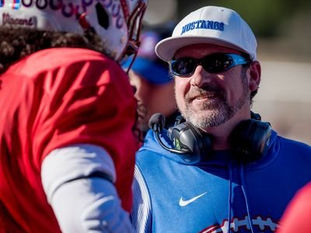GET NOTICED! GET RECRUITED!
Lanceo's Articles
Stay Informed with Expert Insights!
Explore Lanceo’s Articles for practical tips and deep dives on recruiting, training, and staying ahead of the game. Our easy-to-read guides help you navigate every step with confidence.

Exploring the Impact of Family Dynamics on the Pathway to D1 Football Recruitment
0
14
0
The journey to Division 1 (D1) football recruitment is not just about skills on the field; it's also a complex web of support, values, and opportunities influenced by family dynamics. Families play a pivotal role in shaping young athletes’ paths, impacting their development, motivation, and overall prospects. In this post, we will explore how these family dynamics can either pave the way or create obstacles on a young player's journey to D1 football.

The Importance of Family Support
Family support is the backbone for many successful athletes. From a young age, the belief that a child can succeed creates an environment where talent can thrive. Families often provide encouragement, emotional backing, and financial investment in crucial resources like training and equipment.
For instance, a recent study noted that 85% of high school athletes credited their family as their primary source of motivation. When parents attend games or help with practice, it boosts the athlete's confidence. This belief in their potential not only encourages them to train harder but also instills a strong sense of resilience—an essential trait for competing at the collegiate level.
Additionally, during the often overwhelming recruitment phase, a supportive family can offer vital perspective. For example, families that discuss an athlete's aspirations can help reframing recruitment as an exciting journey, making the entire process feel less daunting.
Economic Factors and Accessibility
Financial stability impacts opportunities in sports significantly. Families with higher income levels can afford better training facilities, skilled coaching, and entry fees for competitions. For instance, parents who invest in skills camps may find their child participating in showcases that lead to recruitment opportunities. Statistics show that athletes attending specialized camps are 4 times more likely to be recruited by a D1 program.
On the other hand, athletes from economically challenged backgrounds might miss out on critical developmental experiences. Costs for travel, gear, and training can be prohibitive. However, many families can still create supportive environments by emphasizing hard work and leveraging community resources like local sports leagues or free training sessions.
Parental Involvement in Athletic Development
Parental involvement is crucial in shaping an athlete's approach to training and competition. The right balance between support and independence is important. Excessive pressure can lead to burnout, while a lack of guidance may leave an athlete feeling isolated.
Engagement can come in different forms. Parents attending games create bonding experiences that foster a love for the sport. This active involvement not only supports the athlete emotionally but also provides insight into the D1 recruitment process—from networking with coaches to understanding assessment requirements.
For example, parents who invest time in understanding recruitment intricacies can better guide their children on the necessary steps to increase visibility and success.
Sibling Influence and Competition
Siblings serve as both competition and support. In families with multiple young athletes, the competitive spirit can be a powerful motivator. An older sibling’s success can inspire younger siblings, driving them to improve their skills. For instance, a younger sibling who watches an older brother achieve a scholarship may feel encouraged to push their limits in practice.
This competitive dynamic, while sometimes intense, can also create a collaborative atmosphere. Siblings attending the same camps or schools can learn together about the commitment needed for D1 athletics, providing a built-in support network through shared experiences.
Creating an environment that celebrates each child’s achievements, regardless of their recruitment outcomes, fosters a healthy sibling rivalry. This approach ensures all athletes feel valued and motivated to succeed.
Communication and Decision-Making
Effective family communication is vital for young athletes navigating D1 recruitment. Open discussions about college options, career goals, and the demands of student-athlete life equip athletes with the knowledge needed for making informed choices.
Families that engage in conversations about balancing academics with athletics help athletes prepare for the demands they will face. For example, parents who educate themselves on recruitment processes can better support their children’s objectives. This can include understanding timelines and how to prepare for recruitment assessments, which are often intimidating.
Encouraging open expression of feelings and aspirations creates a foundation for strong family support. When family members listen and validate an athlete's concerns, it enhances collaboration in decision-making processes.
Family Values and Athletic Philosophy
The values instilled by family significantly shape an athlete's approach to sports. Families that stress the importance of discipline and teamwork prepare their children for the challenges of competitive athletics. Around 90% of successful athletes attribute their achievements to their family upbringing, highlighting the role of values.
An encouraging philosophy towards competition also prepares young athletes for the realities of recruitment. Fostering resilience in the face of setbacks teaches athletes crucial lessons, not only for sports but for life.
Families that emphasize integrity and fair play influence how their children conduct themselves in recruitment scenarios. Recruiters valued qualities such as sportsmanship and respect, which stem from the family environment.
The Role of Extended Family and Community
The impact of extended family and community on an athlete’s journey should not be overlooked. Grandparents, aunts, uncles, and community members can provide additional support and mentorship. Often, they share in the pride of an athlete's achievements and reinforce positive behaviors.
Local community programs and sports clubs can also be vital for young athletes. Participation in team sports helps build networks with coaches and like-minded peers, increasing visibility among recruiters. Communities that foster sports create environments where young athletes thrive, contributing to increased recruitment opportunities.
By accessing community resources and support, families equip their children to face the recruitment landscape more favorably.
Mental Health and Well-Being
The pressures of D1 recruitment can lead to mental health challenges for athletes. Family dynamics play a critical role in shaping how these pressures are managed. Families that prioritize mental and emotional health foster environments that lessen anxiety, often resulting in improved performance.
Teaching athletes that their self-worth is not solely based on sports performance counters the intense pressure to succeed. Encouraging a range of hobbies outside sports and discussing mental health openly can lead to well-rounded individuals who handle recruitment challenges with greater ease.
Recognizing the importance of seeking help when needed normalizes discussions about mental health, ensuring athletes remain focused on their goals without feeling overwhelmed.
Final Thoughts
The journey toward D1 football recruitment is heavily influenced by family dynamics. From support and communication to values and community involvement, families can either create pathways to success or place undue pressures on young athletes. By understanding and navigating these dynamics, families can foster an environment that promotes athletic growth while prioritizing the mental and emotional health of their children. In the competitive world of D1 football recruitment, a supportive family foundation may be just as vital as raw talent.






